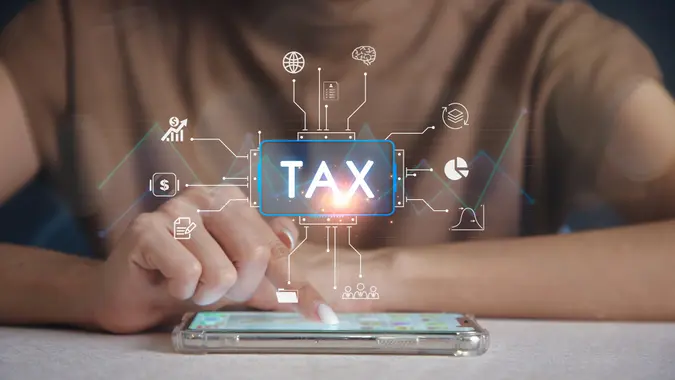I Asked ChatGPT What Would Happen If Billionaires Paid Taxes at the Same Rate as the Average New Yorker

Commitment to Our Readers
GOBankingRates' editorial team is committed to bringing you unbiased reviews and information. We use data-driven methodologies to evaluate financial products and services - our reviews and ratings are not influenced by advertisers. You can read more about our editorial guidelines and our products and services review methodology.

20 Years
Helping You Live Richer

Reviewed
by Experts

Trusted by
Millions of Readers
The United States is home to around 900 billionaires, and their combined personal wealth hit a record $7.6 trillion as of Labor Day 2025, according to data cited by the nonprofit Americans for Tax Fairness. That figure has more than doubled in less than eight years.
While billionaires continue to gain more wealth, many also continue to benefit from some tax laws that let them keep a greater percentage of their money. This is true in states with comparatively low tax rates as well as states with high rates, like New York.
What would happen if billionaires paid taxes at the same rate as the average New Yorker? GOBankingRates asked ChatGPT that question. Here’s what it said.
Different Incomes, Different Tax Obligations
The effective tax rate for billionaires is “well below” ordinary wage earners because of the way they make money, according to ChatGPT. Income for billionaires is often from capital gains, dividends, stocks, real estate and other investments that are taxed at lower rates than regular wages.
In contrast, the average New Yorker — like many workers — pays taxes primarily on wages. This means they face higher marginal income tax rates along with payroll taxes, state taxes and local taxes.
Billionaire Tax Rates
ChatGPT pulled data from several sources to determine the typical tax rate paid by billionaires vs. most other Americans. One thing it found is that billionaires pay an effective tax rate as low as 8% to 15%. The average New Yorker pays closer to 25% to 30% when considering all taxes, per ChatGPT.
Here’s a look at some of the research ChatGPT cited:
- White House Report (2010-2018): An analysis by the White House Council of Economic Advisers estimated that the wealthiest 400 families paid an average federal individual income tax rate of 8.2% during this period, which is “notably lower” than the average American taxpayer’s rate, per ChatGPT.
- ProPublica Analysis (2014-2018): Investigating leaked tax returns, ProPublica found that the 25 richest Americans paid a combined total of $13.6 billion in federal income taxes, resulting in a “true tax rate” of about 3.4%.
- Americans for Tax Fairness Report: An analysis of 26 top billionaires revealed an average effective tax rate of 4.8% over six recent years, based on their wealth growth. Some high-profile individuals paid less than 2% — including Warren Buffett at 0.1% and Jeff Bezos at 1.1%
What Would Happen If Billionaires Paid More?
Because billionaires earn a lot more money than everyone else, taxing them at the average New Yorker’s rate could generate “tens or even hundreds of billions more in government revenue,” according to ChatGPT.
This additional money could be used to fund infrastructure and public services — particularly education, healthcare, housing and transit. Some of it also could be used to reduce government deficits.
Beyond that, higher taxes on billionaires could “slow the rapid accumulation of extreme wealth, possibly reducing the gap between the super-rich and average citizens.”
The main risk of having billionaires pay higher tax rates is that it might reduce incentives for investment or entrepreneurship, which could lead to slower economic growth. ChatGPT noted, however, that studies have shown that moderate increases in taxes on the wealthy have a “limited impact” on economic growth.
Editor’s note on political coverage: GOBankingRates is nonpartisan and strives to cover all aspects of the economy objectively and present balanced reports on politically focused finance stories. You can find more coverage of this topic on GOBankingRates.com.
 Written by
Written by  Edited by
Edited by 

























